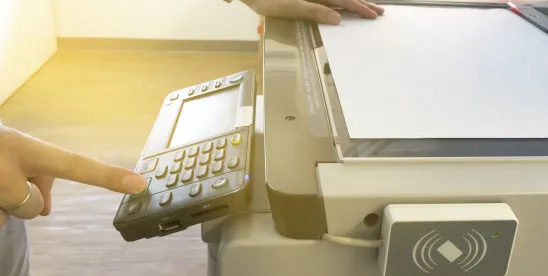On June 5, 2025, in Richard E. Fischbein, M.D. v. IQVIA, Inc., the U.S. District Court for the Eastern District of Pennsylvania issued a major ruling that denied certification in a TCPA junk fax case AND further confirmed that the TCPA’s protections only apply to traditional fax machines, not to online fax services. No. CV 19-5365, 2025 WL 1616793 (E.D. Pa. June 5, 2025). The court held that the TCPA’s unsolicited fax provisions apply only to faxes received on traditional, stand-alone fax machines, not to modern online fax services. Because determining which type of equipment each potential class member used would require extensive individual inquiries, the court found the proposed class was neither ascertainable nor suitable for class treatment.
This ruling comes as no surprise. As we have seen the Fourth Circuit enter a similar ruling in Career Counseling, Inc., d/b/a Snelling Staffing Services v. Amerifactors Financial Group, LLC., 2024 WL 220377.
The case was initiated by Dr. Richard E. Fischbein, who sought to represent a class of potentially more than 25,000 healthcare providers. The lawsuit alleged that the health information company IQVIA, Inc. had sent unsolicited fax advertisements between 2016 and 2018, inviting medical professionals to participate in a “National Healthcare Census” in exchange for reward points. Dr. Fischbein argued that these faxes constituted “unsolicited advertisements” transmitted without the recipients’ prior consent, which is prohibited by the TCPA.
The TCPA defines “telephone facsimile machine” as “equipment which has the capacity (A) to transcribe text or images, or both, from paper into an electronic signal and to transmit that signal over a regular telephone line, or (B) to transcribe text or images (or both) from an electronic signal received over a regular telephone line onto paper.”
The court found that the definition is unambiguous and that the language contemplates a stand-alone piece of equipment with the built-in capacity to print. The court concluded that this interpretation is supported by the law’s distinction between the broad range of equipment that can send a fax (“telephone facsimile machine, computer, or other device”) and the single type of equipment protected from receiving one (a “telephone facsimile machine”). As such, it held that “the plain language of the TCPA protects only those who receive unsolicited advertisements on a stand-alone fax machine.”
And this statutory interpretation created the central problem for class certification: ascertainability.
To be certified, a class must be identifiable through a reliable and administratively feasible mechanism. Here, that meant the plaintiff had to have a way to determine which of the potentially 25,000 class members received the disputed faxes on a stand-alone machine. The plaintiff’s own expert testimony proved fatal to this requirement. The court quoted the expert’s deposition, where he was asked if there was a reliable method to determine the receiving equipment used. He responded, “Not consistently, no.” He further, more or less, conceded that the only way he can think of to determine the receiving equipment used would be through an “individualized inquiry asking each intended recipient whether they received the fax via online fax service provider.”
In light of this testimony, the court found that “the only way to determine which health care providers received faxes by way of a traditional, stand-alone fax
machine is through ‘extensive and individualized fact-finding.'” And as such, the court ruled that the class was deemed not ascertainable.
The failure of ascertainability also directly led to the failure of Rule 23(b)’s predominance requirement. This rule requires that questions of law or fact common to the class must predominate over questions affecting only individual members.
The court found that the question of what type of equipment a recipient used was a “core component of liability” that could not be answered with common evidence. Because this essential element required an individualized inquiry for every potential class member, the court concluded that individual issues would overwhelm any common ones. Ultimately, because the type of receiving equipment was an individualized question as to an essential element, the court found that plaintiff failed to meet the predominance requirement.
So because it failed to meet the ascertainability and predominance requirements, the court denied class certification.




 />i
/>i

